Editor's note: Newt Gingrich is a co-cost of CNN's new "Crossfire," which airs at 6:30 p.m. ET weekdays. A former speaker of the House, he was a candidate in the 2012 Republican presidential primaries.
(CNN) -- Monday's CNN poll results just plain surprised, almost shocked me.
When I saw the poll was due to be released, I expected the Republicans to be taking a beating considering the terms President Barack Obama and his staff have been using to describe them over the past 10 days ("extremists," "people with a bomb strapped to their chest") and the unfair, derogatory press coverage of their position.
The results are so dramatically better for Republicans and worse for the Democrats and Obama than I expected that I was curious to see just how much better Republicans are faring during the shutdown of 2013 (and how much worse the president and the Democrats are faring) than in comparable polls of the 1995-96 shutdowns.
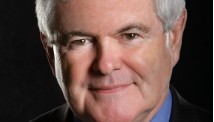 Newt Gingrich
Newt Gingrich What I discovered was revealing and runs against the entire media narrative of this year's struggle over the continuing resolution and the debt ceiling.
Let's start with the shutdowns during the Clinton administration when I was leading House Republicans. There were two: one in November 1995 and one in December '95 and early January 1996.
A CNN poll at the time showed Americans blamed Republicans over President Bill Clinton for the first shutdown by almost 2-to-1, 49% to 26%.
Republicans fared only a little better in the second shutdown of the mid-'90s. A CNN poll after it began showed the American people preferred Clinton's approach to that of the Republicans by 52% to 38%.
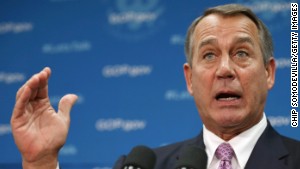 Boehner: Country is on 'dangerous path'
Boehner: Country is on 'dangerous path' 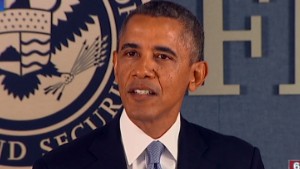 Obama: Won't 'negotiate' under threat
Obama: Won't 'negotiate' under threat 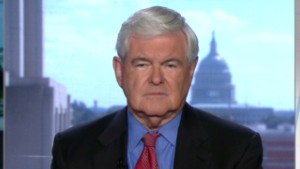 Gingrich: Obama should negotiate
Gingrich: Obama should negotiate 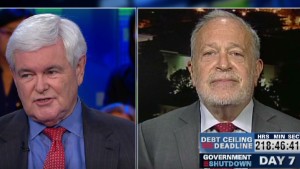 Reich: Gingrich, my friend, you're wrong
Reich: Gingrich, my friend, you're wrong Sixty-two percent said they had negative feelings about the Republican leaders during that conflict, compared with only 49% about Clinton.
This is not to say the shutdowns were a strategic mistake. Quite the opposite: The enormous progress we made afterward -- four consecutive balanced budgets, welfare reform, the first tax cut in 16 years -- was a direct result of Republicans standing firm in 1995 and early 1996. It proved to Clinton, and more importantly to the country, that we were serious about the ideas we had run on in 1994. As a consequence, we were the first re-elected Republican majority in the House since 1928.
In the long run, in other words, the shutdowns didn't do us any damage, a fact Gallup documented recently.
But as the above poll numbers suggest, most Americans were clearly frustrated during those shutdowns, and in the immediate term they blamed Republicans. In retrospect I brought some of this on us because I was very firm and clear beforehand that we were prepared to close the government if that was what it took to get an agreement to balance the federal budget.
In a sense, Americans were right to blame (or credit) us with the shutdowns because we were in fact on offense, seeking a decisive change in government. As the first House Republican majority in 40 years, we were feeling empowered, and we probably showed it too clearly.
There was another big reason why the public gave Clinton the benefit of the doubt, however. He was consistently willing to talk and to meet. People saw him as a reasonable guy trying to help get to a solution. And since Republicans controlled both the House and the Senate, the congressional Democrats were not a big part of the public drama.
Because we were so openly pushing for a big change and Clinton was so willing to be reasonable, the American people naturally attributed the shutdowns to us and gave Clinton good marks for at least trying to negotiate.
Today the situation is radically different.
Virtually every Republican has learned from 1995-1996. Republicans' consistent refrain is that they don't want to shut the government. They constantly say that they want to negotiate, to make a deal, and that they're frustrated by Obama's refusal to talk.
The president, on the other hand, has taken the hard-line position that he will not negotiate, repeating this on television practically every day. In addition, he has used his office to cause as much pain to the people as he reasonably can, including very public and unnecessary pain for our soldiers, veterans and small business owners.
This behavior strikes most Americans as offensive and unfair.
I thought, however, that with the general bias of the press coverage -- the overemphasis on Republican dissent, the almost complete avoidance of covering Democrats who have split with their leaders to vote in favor of clean, piecemeal continuing resolutions to fund parts of the government, and the normal process of giving Obama a permanent benefit of the doubt -- that Monday's poll results would have been better than 1995-96 but still clearly anti-Republican.
The results were vastly better for the Republicans and worse for Obama than I expected.
When asked in the CNN poll whom they are angry at, 63% said Republicans, 58% said Democrats and 53% said Obama. That is a 10-point margin for the president and only a 5-point margin for Democrats, compared with a 23-point margin in November 1995.
Independents said they blamed all three equally (60% GOP, 59% Democrats, 58% Obama). This is so clearly within the margin of error that it is for all practical purposes a tie.
After weeks of the media focusing blame on House Speaker John Boehner, Sen. Ted Cruz and the House Republicans, it is clear the American people are not buying it.
There have been too many days of the president saying, "I will not negotiate."
The country believes him. They can see he's a big part of the reason the government is shut down.
If House Republicans continue to pass targeted, clean continuing resolutions to fund parts of the government and Senate Republicans demand day after day for the right to vote on these popular measures, the margin of blame may begin shifting from virtual parity to a solidly Democratic problem.
If the Republicans repeat every day their willingness to negotiate and Obama and Senate Majority Leader Harry Reid repeat every day their refusal to negotiate, this may become catastrophic for the Democrats.
Follow us on Twitter @CNNOpinion.
Join us on Facebook/CNNOpinion.
{ 0 comments... read them below or add one }
Post a Comment